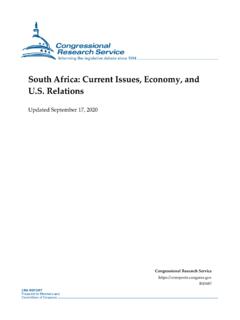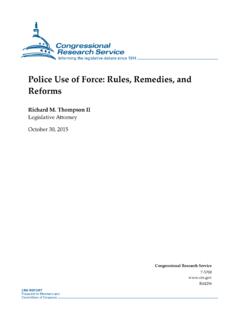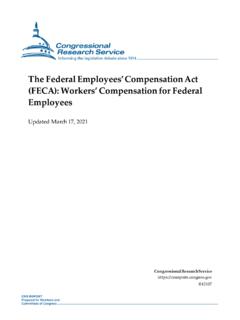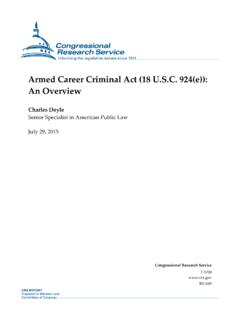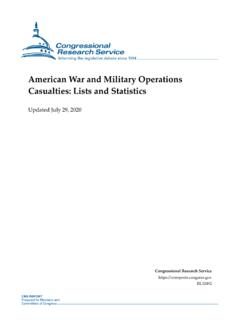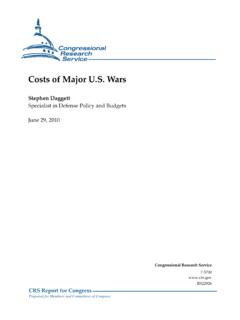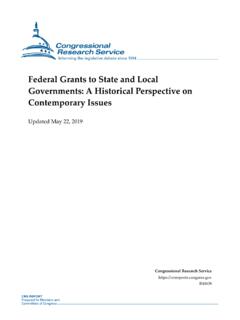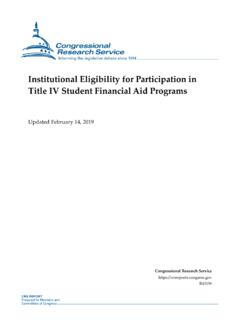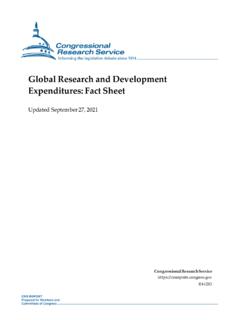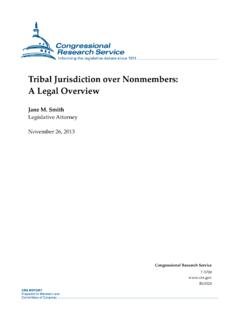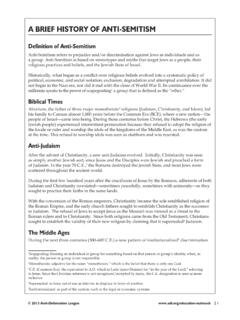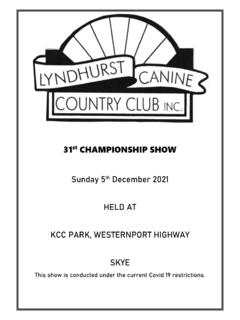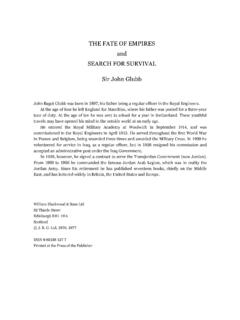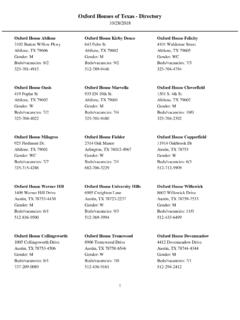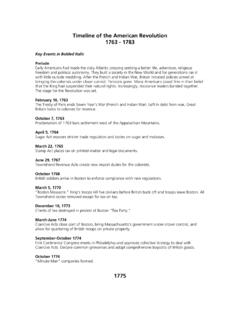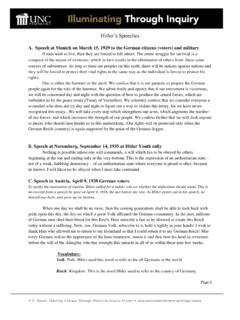Transcription of The Federal Tort Claims Act (FTCA): A Legal Overview
1 The Federal Tort Claims Act (FTCA): A Legal Overview Updated November 20, 2019 Congressional Research Service R45732 Congressional Research Service SUMMARY The Federal Tort Claims Act (FTCA): A Legal Overview A plaintiff injured by a defendant s wrongful act may file a tort lawsuit to recover money from that defendant. To name a particularly familiar example, a person who negligently causes a vehicular collision may be liable to the victim of that crash. By forcing people who wrongfully injure others to pay money to their victims, the tort system serves at least two functions: (1) deterring people from injuring others and (2) compensating those who are injured.
2 Employees and officers of the Federal government occasionally commit torts just like other members of the general public. For a substantial portion of this nation s history, however, plaintiffs injured by the tortious acts of a Federal officer or employee were barred from filing lawsuits against the United States by sovereign immunity a Legal doctrine that ordinarily prohibits private citizens from haling a sovereign state into court without its consent. Until the mid-20th century, a tort victim could obtain compensation from the United States only by persuading Congress to pass a private bill compensating him for his loss.
3 Congress, deeming this state of affairs unacceptable, enacted the Federal Tort Claims Act (FTCA), which authorizes plaintiffs to obtain compensation from the United States for the torts of its employees. However, subjecting the Federal government to tort liability not only creates a financial cost to the United States, it also creates a risk that government officials may inappropriately base their decisions not on socially desirable policy objectives, but rather on the desire to reduce the government s exposure to monetary damages. In an attempt to mitigate these potential negative effects of abrogating the government s immunity from liability and litigation, the FTCA limits the circumstances in which a plaintiff may pursue a tort lawsuit against the United States.
4 For example, the FTCA contains several exceptions that categorically bar plaintiffs from recovering tort damages in certain categories of cases. Federal law also restricts the types and amount of damages a victorious plaintiff may recover in an FTCA suit. Additionally, a plaintiff may not initiate an FTCA lawsuit unless he has timely complied with a series of procedural requirements, such as providing the government an initial opportunity to evaluate the plaintiff s claim and decide whether to settle it before the case proceeds to Federal court.
5 Since Congress first enacted the FTCA, the Federal courts have developed a robust body of judicial precedent interpreting the statute s contours. In recent years, however, the Supreme Court has expressed reluctance to reconsider its long-standing FTCA precedents, thereby leaving the task of potentially further developing the FTCA to Congress. Some Members of Congress have accordingly proposed legislation to modify the FTCA in various respects, such as by broadening the circumstances in which a plaintiff may hold the United States liable for torts committed by government employees.
6 R45732 November 20, 2019 Kevin M. Lewis Legislative Attorney The Federal Tort Claims Act (FTCA): A Legal Overview Congressional Research Service Contents Introduction .. 1 Background .. 3 The Preclusion of Individual Employee Tort Liability Under the FTCA .. 7 Employees and Independent Contractors .. 8 The Boyle Rule .. 10 Scope of Employment .. 11 Attorney General Certification .. 13 Exceptions to the FTCA s Waiver of Sovereign Immunity .. 16 The Discretionary Function Exception .. 18 Whether the Challenged Conduct Is Discretionary.
7 19 Whether Policy Considerations Influence the Exercise of the Employee s Discretion .. 22 The Intentional Tort 24 The Exception to the Intentional Tort Exception: The Law Enforcement Proviso .. 26 The Foreign Country Exception .. 27 The Military Exceptions .. 28 The Combatant Activities Exception .. 28 The Feres Doctrine .. 29 Other Limitations on Damages Under the FTCA .. 31 Procedural 33 Legislative Proposals to Amend the FTCA .. 36 Proposals to Abrogate or Modify Feres .. 38 Private Bills .. 40 Contacts Author Information .. 41 The Federal Tort Claims Act (FTCA): A Legal Overview Congressional Research Service 1 Introduction A plaintiff injured by a defendant s wrongful conduct may file a tort lawsuit to recover money from that To name an especially familiar example of a tort, a person who causes a crash by negligently driving a vehicle is generally liable to the victim of that crash.
8 2 By forcing people who wrongfully injure others to pay money to their victims, the tort system serves at least two functions: (1) deter[ring] people from injuring others and (2) compensat[ing] those who are injured. 3 Employees and officers of the Federal government occasionally commit torts just like other members of the general Until the mid-20th century, however, the principle of sovereign immunity a Legal doctrine that bars private citizens from suing a sovereign government without its consent prohibited plaintiffs from suing the United States for the tortious actions of Federal officers and Thus, for a substantial portion of this nation s history.
9 Persons injured by torts committed by the Federal government s agents were generally unable to obtain financial compensation through the judicial Congress, deeming this state of affairs unacceptable, ultimately enacted the Federal Tort Claims Act (FTCA) in The FTCA allows plaintiffs to file and prosecute certain types of tort lawsuits against the United States and thereby potentially recover financial compensation from the Federal Some FTCA lawsuits are relatively mundane; for instance, a civilian may sue the United States to obtain compensation for injuries sustained as a result of minor accidents on Federal Other FTCA cases, however, involve grave allegations of government misfeasance.
10 For example, after naval officers allegedly sexually assaulted several 1 See, , Tort, BLACK S LAW DICTIONARY (10th ed. 2014) (defining tort as a civil wrong, other than breach of contract, for which a remedy may be obtained, usu[ally] in the form of [monetary] damages ). See generally CRS In Focus IF11291, Introduction to Tort Law, by Kevin M. Lewis (describing tort law, its purposes, and its relevance to Congress). 2 Bryant Walker Smith, Automated Driving and Product Liability, 2017 MICH.
